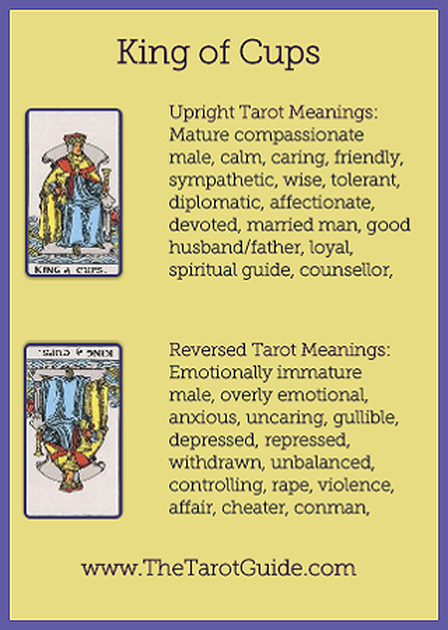The King of Cups is a compelling figure within the Tarot system, often revered for his emotional acuity, compassionate wisdom, and intuitive governance. In a Christian context, his symbolism can take on additional layers of significance, particularly regarding how emotional intelligence and moral integrity are woven into the fabric of one’s spiritual journey. In examining the multi-faceted meaning of the King of Cups, what role might he play in navigating the complexities of life’s emotional landscape—from grappling with personal struggles to fostering deeper relationships with others and God? This inquiry invites a deeper exploration into how this card intersects with Christian values and teachings.
To begin with, the King of Cups encapsulates emotional balance. Christian teachings frequently emphasize the importance of emotional self-regulation. Just as the King skillfully masters his emotions, Christians are called to embody the fruits of the Spirit, particularly those of patience and kindness. The challenge then arises: how can one maintain emotional equilibrium amid life’s tribulations, while remaining steadfast in faith?
Consider, for instance, the wisdom of Proverbs: “A soft answer turns away wrath, but a harsh word stirs up anger.” Herein lies a profound parallel to the King of Cups, who embodies serenity even against tumultuous forces. In essence, he suggests that one might not only navigate personal turmoil but can also influence those around them positively. The King’s stoic demeanor serves as an exemplar, encouraging Christians to approach confrontations and conflicts with a spirit of understanding rather than animosity.
Furthermore, the King of Cups is fundamentally altruistic, often guiding others through their emotional storms. In the New Testament, Christ exhibits this same nurturing spirit. He invites the weary to find solace in Him: “Come to me, all you who are weary and burdened, and I will give you rest.” This invitation mirrors the King of Cups, who represents a safe harbor in turbulent waters. He beckons individuals toward vulnerability, inviting them into a space where feelings can be expressed and understood. How does this reflection guide Christians in their relationships? It prompts a vital consideration: Are we cultivating an environment that allows others to express their vulnerabilities, or are we erecting barriers through judgment or dismissal?
A historical lens also reveals that the King of Cups can be viewed as the archetype of the benevolent leader, much like Jesus, who exemplified servant leadership. The challenge lies in the dichotomy of authority and emotional labor; leaders can sometimes become disenfranchised from their followers’ emotional experiences. Thus, when a leader’s authority overwhelms their ability to empathize, they can become detached—an antithesis to the essence of the King of Cups, who is deeply engaged with the emotional well-being of those he governs. How can today’s Christian leaders adapt this archetype into their practices, ensuring they are not merely figures of authority, but also sources of emotional support?
In addition, the narrative surrounding the King of Cups intersects intriguingly with the Christian notion of discernment. The King is often depicted as a figure of wisdom, imbued with the ability to make balanced decisions that take into account not just rationality but also the emotional implications of those decisions. In Christian practice, discernment plays a critical role in decision-making. Christians are encouraged to seek guidance from the Holy Spirit, reflecting on the emotions and impulses that arise in response to different choices. The King of Cups serves as a reminder to infuse emotional intelligence into discernment: Are we listening to our feelings while also anchoring our choices in faith and wisdom?
Moreover, the symbolism of water, associated with the King of Cups, has rich biblical connotations. Water is frequently referred to as a source of life and renewal. In John’s Gospel, Jesus speaks of the “living water” which quenches spiritual thirst. This element intertwines beautifully with the King’s ability to nurture and rejuvenate. So, how can Christians harness the regenerative power of emotional expression and community support that the King of Cups embodies? It is an essential inquiry: Do we acknowledge the importance of emotions as conduits for spiritual growth?
As we delve into personal reflection, we must confront a sobering challenge: the hesitancy to embrace vulnerability. In a world often marred by bravado and stoicism, admitting to feeling overwhelmed or uncertain can feel like an insurmountable obstacle. The King of Cups, however, challenges this narrative. He proclaims that true strength lies not in emotional detachment but rather in the courage to be vulnerable. How would embracing the King’s ethos reshape our interactions with others and deepen our relationship with the Divine?
In conclusion, the King of Cups offers rich and nuanced interpretations within a Christian framework. His representation of emotional balance, compassionate leadership, and the pursuit of discernment is a profound guidepost for believers. Each of these attributes invites personal reflection on how Christians can strive to embody these virtues in their lives. The interplay between emotional intelligence and spiritual integrity poses essential questions: Are we, like the King of Cups, capable of guiding others through emotional currents? Can we find strength in vulnerability? Ultimately, the King of Cups invites us to cultivate a community that nurtures emotional wellness—reflecting the heart of Christ in every interaction.







Leave a Comment